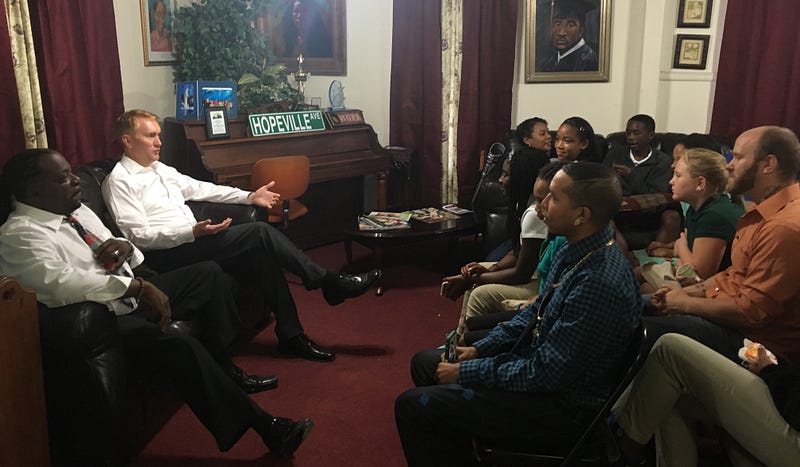Preventing a Life of Poverty
Investing In At-Risk Youth Through Education
by Senate Opportunity
In many low-income communities across America, opportunities simply do not exist for children and young people. Activities like piano lessons, language tutors, theater, karate, sports clinics and leadership camps simply aren’t a reality for many kids whose parents are barely making it. For families who can afford extracurricular activities, these opportunities expand educational opportunities, bring emotional fulfillment, build self-esteem and even lead to successful careers.
This is why nonprofits like a “Pocket Full of Hope, Inc” are so valuable. Organizations and programs like these redirect many young people, who otherwise might be on a path towards discouragement and poverty. Pocket Full Of Hope Inc. is a community- based nonprofit organization that serves north Tulsa, Oklahoma. It serves young people by offering after-school programs that center around the arts — primarily music, art, theater and dance. The organization also provides conflict resolution and de- escalation training in schools, with the goal of stemming juvenile incarceration.
The north Tulsa area is a region that has never fully recovered from its vibrant economy and community of the late 1800’s and early 1900’s. Since the 1921 Tulsa Race Riot, in which an estimated 300 individuals were killed, the area has experienced inconsistent growth and a frail economy. According to census data, the City of Tulsa experiences a poverty rate around 20 percent, with child poverty ranging from five to six percent higher. The overall national poverty rate for 2015 was 13.5 percent. In addition, north Tulsa experiences higher rates of unemployment, compared to the rest of the region.

Pocket Full of Hope has helped mentor and guide hundreds of low- income youth in the north Tulsa area, and they are looking to expand. The organization has found a new and bigger permanent home in what used to be the Big 10 Ballroom, a music venue built in 1948 that once featured appearances by Ray Charles, James Brown, and Tina Turner. The building had been empty for 20 years, when Lester Shaw, executive director of “Pocket Full of Hope,” saw it as the future home of his nonprofit. Shaw purchased the building in September 2008 for $150,000 from the Mount Zion Baptist Church, and has been working to get it up to code for the past eight years.
The mission of this organization is one that is close to Senator James Lankford’s heart, because of the focus on youth and prevention. Before his time in Congress, from 1995 to 2009, Lankford served as Director of the Falls Creek Youth Camp, the largest youth camp in the United States, with more than 51,000 individuals attending each summer.
On average, the organization sees about 350 youth from the local community throughout the year. They strive to create a risk-free environment for all participants to encourage them to explore problem resolution and change. The goal is to have the students empower themselves in a non-threatening, participatory and inclusive atmosphere using music, theatre, and dance.
One success story is Courtney Johnson, a young person who started participating
in Pocket Full of Hope’s theater programs in the 5th grade. Tuesday and Thursday rehearsals became the highlight of her week throughout middle school and high school. After her theater roles in The Wiz, and Thriller, she never looked back! Because of the nonprofit’s influence on her life, she pursued college and stayed in college, at Langston University, because of Dr. Shaw’s encouragement and influence in her life. Now, Courtney is a 4th grade teacher in Tulsa.
Shaw’s vision is that “A Pocket Full of Hope” will continue to make a positive impact in the Tulsa community by providing local youth an outreach program where they can express themselves though music, dance, film, and photography. He wants to help them develop life skills and a sense of social responsibilities that will open up opportunities in their future.
Lankford believes that a child’s zip code should never determine their future, and nonprofit programs like Pocket Full of Hope should be at the forefront of redirecting and helping at-risk youth reach their full potential.

